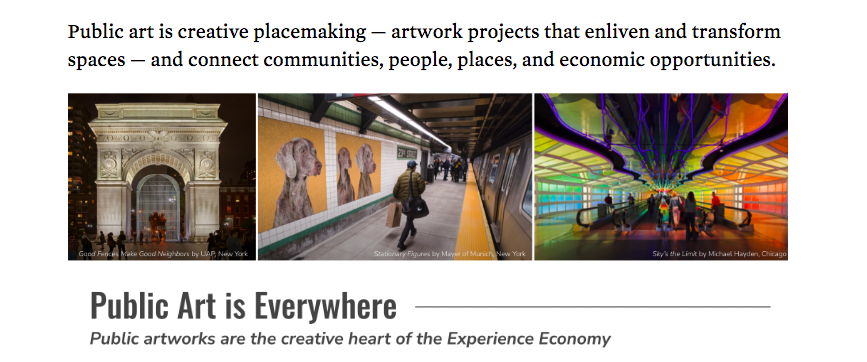Top banner photo: Phoebe, by Matthew Mazzotta
What is public art?
You may wonder what the difference between public art and other kinds of art is. Public art is creative placemaking — artwork projects that enliven and transform spaces — connecting communities, peoples, places, and economic opportunities. The "public" part also refers to the process of how such art is created, or commissioned, as well as the community that is the intended audience, the people living or encountering the project in its immediate vicinity, and the world at large. Historically, much art was produced thanks to wealthy royal patrons of the arts or religious organizations hiring artists. As times, attitudes, means, and prices affecting what is art itself have changed, public art has become more democratic, influenced by ideas of access and intent. It is art which can now be created or financed by almost anyone – for example: a local government, an individual, or a corporation. Public art can also be iconic – think of the Eiffel Tower, Cloud Gate, or similar, frequently large-scale projects, representing places or particular ideas. In this way, public art can truly be a tangible manifestation of culture. Beyond the scope of a singular artist or artistic team vision, it is part of the essential landscapes and stories we live in, work in, and share with one another.

Who are the public artists making this work?
Public art is about access and intent. Public artists are frequently hired or commissioned through RFPs (Requests for Proposals) or open calls, where a commissioner or group of stakeholders votes, along with input from the community or representatives of an organization. Any artist could be a public artist, but unless commissioned in such a way as described above, that doesn't mean all of the work, or any of the work, that artist makes is public art. Public art is not necessarily confined to one medium, either: it can engage multiple senses or just one, it can have interactive components, such as a sculpture which moves or makes sound when motion sensors are activated, or be static, like many wall murals on building facades are. Public art can involve light, technology, music, or a wide assortment of media. The creatives we meet through CODAworx have all kinds of art backgrounds: some used to sell their work only at galleries or art fairs, others have advanced art degrees from universities and specialize in just one or two mediums, and many have worked with trailblazed their own paths, collaborating with brands or major companies to realize projects in immersive shopping or corporate environments, at inspiring events and gatherings, or to design elevated experiences transforming the typically mundane into something more magical.
CODAcommission is the #1 way to learn about, share, and apply to public art calls from around the world.
Who is part of the public art industry?

If you wanted to list every profession that could be considered as part of the public art industry, it would take a significant amount of time...and you might still miss out on at least a few key professions.
What is most important to know is that the public art industry is large, dynamic, and growing exponentially every year. This growth is being fueled by the experience economy - as more and more travelers, shoppers, and residents seek out public engagement that is safe, joyful, and memorable. Many of these professionals are on the CODAworx platform — fostering connections that lead to transactions.
New players are investing in public art. Economic development agencies are seeking to drive tourism. Real estate developers are using public art to differentiate their commercial and residential projects. Businesses are using public art to enhance their brands and elevate employee retention. Public art is almost everywhere your imagination can think of!









